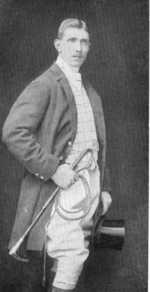Franz von Papen
| Surname | Papen |
| Given Name | Franz |
| Born | 29 Oct 1879 |
| Died | 2 May 1969 |
| Country | Germany |
| Category | Government |
| Gender | Male |
Contributor: C. Peter Chen
ww2dbaseFranz Joseph Hermann Michael Maria von Papen zu Köningen was born in Werl, Westphalia, German Empire to Friedrich von Papen and Anna Laura von Steffens. He was educated as a military officer, including a period serving as a military attendant in the Kaiser's Palace. On 3 May 1905, he married Martha von Boch-Galhau. In Mar 1913, he was assigned to the German General Staff. In Dec 1913, he became a military attaché to the German ambassador to the United States. In early 1914, he traveled to Mexico to observe the Mexican Revolution.
ww2dbaseAfter returning to the United States, Papen was expelled from the country on 28 Dec 1915, during WW1, after being associated to a sabotage effort; en route, his luggage was confiscated, and 126 check stubs were discovered showing payment to various agents. In Apr 1916, a US federal grand jury issued an indictment against Papen for involvement in sabotage plans to destroy the Welland Canal in Canada, though by that time he was already back in Germany; the indictment remained effective until he became the Chancellor of Germany in 1932 when the it was dropped out of respect. Back in Germany, he returned to military duty; In 1916 and 1917 he served in France, and from 1917 to the end of the war he served in the Middle East; he attained the rank of major in the army of the Ottoman Empire. As an experienced diplomat, he was also charged with negotiations with Irish and Indian nationals for efforts against Britain. By the end of the war, he was ranked as a lieutenant colonel.
ww2dbaseAfter WW1, Papen retired from the army and entered politics. As a member of the Catholic Center Party, he was a member of the parliament of Prussia between 1921 and 1932. In 1925, he supported Paul von Hindenburg in the presidential election instead of the candidate from his own party. On 1 Jun 1932, Hindenburg appointed Papen the Chancellor in appreciation. The appointment angered the Catholic Center Party members; Papen quit the party on 3 Jun 1932 before the party could expel him. In order to win wider support, he repealed his predecessor's ban on the Nazi SA organization. His courtship with the Nazi Party soon turned against him, as the Nazi Party quickly became more influential in the Reichstag and began to disrespect him. In early Nov 1932, he decided to negotiate with Adolf Hitler, but Hitler demanded many conditions that Papen simply could not meet. Without a choice, Papen resigned on 17 Nov. Months later, he worked with the Nazi Party to get Hitler the Chancellorship, asking in return that he be named as the Vice Chancellor and Prime Minister of Prussia. With this agreement, Papen used his close working relationship with Hindenburg to secure Hitler's appointment as Chancellor, which was achieved on 30 Jan 1933. When Hindenburg warned Papen that he was slowly becoming under Hitler's control, Papen responded "[y]ou are mistaken; we've hired him." It appeared that Hindenburg was correct, however, as Hitler gradually maneuvered Papen away from the center of the stage. On 8 Apr 1933, Papen traveled to the Vatican on a diplomatic mission; while he was away, the Prussian parliament elected Hermann Göring as the Prime Minister of Prussia on 10 Apr. In 1934, after the Night of the Long Knives, he was placed under house arrest, but within a month he was released and hired by Göring as the ambassador to Austria. He was dismissed from his position on 4 Feb 1938.
ww2dbaseIn 1939, Papen was appointed as the ambassador to Turkey, where he remained until 1944. On 24 Feb 1942, he was the target of an assassination attempt plotted by Russia, but he survived with only minor wounds after the the bomb intended for him detonated prematurely. In Aug 1944, Papen was awarded by Hitler the Knight's Cross of the Military Merit Order.
ww2dbaseNear the end of the war, Papen was arrested by US Army Lieutenant James Watson and men of the 550th Airborne Battalion at his home. Although he was one of the defendants at the main Nuremberg war crimes trial, he was acquitted; the judges noted that he had committed "political immoralities", but none of them warranted war crimes. A West German court later sentenced him to an eight-year prison sentence for working with the Nazi Party, but he was released in 1949. In the 1950s, he attempted to return to politics, but was largely unsuccessful. He lived at the Castle of Benzenhofen near Ravensburg in Upper Swabia in southern Germany. He passed away in Sasbach, Ortenau District, Baden-Württemberg, West Germany.
ww2dbaseSource: Wikipedia.
Last Major Revision: Feb 2010
Franz von Papen Interactive Map
Photographs
 |  |  |  |
Franz von Papen Timeline
| 29 Oct 1879 | Franz von Papen was born. |
| 4 Jun 1932 | German Chancellor Franz von Papen dissolved the Reichstag and announced a new election scheduled for 31 Jul 1932. |
| 5 Jun 1932 | German Chancellor Franz von Papen lifted the ban on Nazi Party's SA organization. |
| 9 Jun 1932 | German Chancellor Franz von Papen and Adolf Hitler met for the first time. |
| 20 Jul 1932 | German Chancellor Franz von Papen dissolved the Prussian government. |
| 17 Nov 1932 | Franz von Papen resigned as the Chancellor of Germany. |
| 1 Dec 1932 | Franz von Papen met with German President Paul von Hindenburg and offered a plan for Germany that was effectively the end of the republic. Hindenburg rejected the plan and offered that given current situation he wished for a coalition government. |
| 17 Jun 1934 | Vice-Chancellor von Papen made a speech at Marburg University in Germany in which he protested about the Nazi control of the press and warning against further radicalism. The Nazi leaders meanwhile were spending that Sunday with the Führer, Hitler, at a conference in Thuringia, Germany, and to them Papen's speech sounded like a rallying call for counter-revolution. Publication of the speech was banned by Goebbels, who was a main target of much of Papen's criticism. |
| 20 Jun 1934 | German Vice Chancellor Franz von Papen complained to President Paul von Hindenburg of the censoring of his 17 Jun 1934 speech by the Nazi Party, threatening to resign if nothing would be done to improve the situation. |
| 7 Sep 1934 | Franz von Papen arrived at Nürnberg, Germany for the 4th Nazi Party rally. |
| 4 Feb 1938 | Franz von Papen received a call at his office in Vienna, Austria from Hans Lammers in Berlin, Germany, noting that Papen was to be relieved of his duties in Austria. Within days, however, Papen would return to duty as Adolf Hitler noticed an opportunity to take Austria. |
| 14 Apr 1945 | Former Chancellor Franz von Papen and three German generals were captured in a raid by American gliderborne troops led by Lieutenant James Watson. |
| 2 May 1969 | Franz von Papen passed away. |
Did you enjoy this article or find this article helpful? If so, please consider supporting us on Patreon. Even $1 per month will go a long way! Thank you. Share this article with your friends: Stay updated with WW2DB: |
Visitor Submitted Comments
27 Feb 2017 06:26:07 AM
The capture of von Papen was led and made by Lieutenant Thomas McKinley. See New York Times front page article, April 15, 1945.
All visitor submitted comments are opinions of those making the submissions and do not reflect views of WW2DB.
» Nuremberg Trials and Other Trials Against Germany
Document(s):
» Reichskonkordat
- » 1,150 biographies
- » 337 events
- » 44,024 timeline entries
- » 1,241 ships
- » 350 aircraft models
- » 207 vehicle models
- » 375 weapon models
- » 123 historical documents
- » 260 facilities
- » 470 book reviews
- » 28,584 photos
- » 432 maps
Captain Henry P. Jim Crowe, Guadalcanal, 13 Jan 1943
Please consider supporting us on Patreon. Even $1 a month will go a long way. Thank you!
Or, please support us by purchasing some WW2DB merchandise at TeeSpring, Thank you!
8 Dec 2010 07:18:41 AM
Wrong! Read Shirer's Rise and Fall of the Third Reich to discover how wrong you are on von Papen.